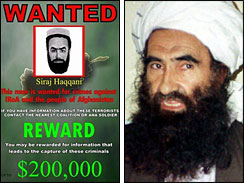
The Taliban is a U.S.- designated “Foreign Terrorist Organization”
Not clear if NATO officials understand that the Taliban are terrorists
Reading time: (Number of words: )
General David Petraeus admitted to Voice of America on October 15, 2010, that NATO officials had recently flown a group of senior Taliban commanders to Kabul for a meeting with President Hamid Karzai. Whoever arranged that visit, or aided and abetted in the travel of these Taliban officials may have committed a felony under American law. Pursuant to U.S. Executive Order 13224, as amended by President George W. Bush in 2002, the “Islamic Movement of Taliban” or “Tahrik-e Islami’a Taliban” (i.e., the Quetta Shura or Afghan Taliban) is officially designated as a “Foreign Terrorist Organization” or FTO. That designation can be found in the Annex to EO 13224 and on the U.S. Treasury’s Internet web site (although it is oddly missing from the State Department’s web site). Such designation makes it a violation of American criminal law to provide any support or assistant to the Taliban. The Taliban is therefore not an insurgent group but a terrorist organization.
This author contacted NATO’s headquarters in Kabul, Afghanistan, which operates under the acronym “ISAF,” and inquired if its officials understood that the Afghan Taliban was a designated terrorist group and that it was a criminal offense to provide any support to them. On November 24, 2010, a response was received from NATO Press Officer U.S. Navy Lieutenant Nicole R. Schwegman, who stated:
“ISAF is not involved in any negotiations with the Taliban. Reconciliation is a government of Afghanistan initiative. ISAF supports the Afghan-led reconciliation process but again, it is an Afghan process.”
This response does not convey a clear impression that U.S. officials appreciate that that the Taliban are terrorists under American law.
On December 2, 2010, the Associated Press published a story entitled: “In Afghan cauldron, realism can trump the rulebook.” The article details the efforts by U.S. officials in Sangin, Afghanistan, who admit to “coordinating with the Taliban to get their approval for development projects, accepting that some money may end up in insurgents’ pockets.” One U.S. Marine official told the AP that “it can be difficult to accept that Marines are coordinating with, and possibly even helping the enemy, but (he) sees no choice.” The Marines contend that they are not supporting “hard-core” Taliban, but they set forth no test for determining who is hard-core and who is soft-core. Regardless, these distinctions do not exist under American law.
The Marines should not be placed into such a precarious legal position. If the U.S. Government is committed to a peace process with the Taliban or if it believes that it must work with some Taliban elements, then it should formally delete the Taliban from its list of terrorist organizations; otherwise, President Obama should make clear that American officials cannot negotiate with or provide any direct or indirect support to a designated terrorist group.
The current legal ambiguity (i.e., the Taliban is both a terrorist organization and a group that we can deal with) undermines the moral position of the United States and erodes public confidence in our Afghan strategy.

Poems for the Hazara
The Anthology of 125 Internationally Recognized Poets From 68 Countries Dedicated to the Hazara
Order Now










Forum posts
12 December 2010, 17:38, by nader
80 prosent of Pahtuns support Terrorist Taliban to attack on Tajiks, Hazaras and Uzbeks.
22 December 2010, 23:33, by Ghazi
80 prosent of Pahtuns support Terrorist Taliban to attack on Tajiks, Hazaras and Uzbeks.
You are oblivious to facts and are simply biased in your views. Most Pashtuns hate the Taliban and their ideology but we do not care for the corrupt Northern Alliance, Sitamis and Shura e Nizar and whoever else is in that faction.